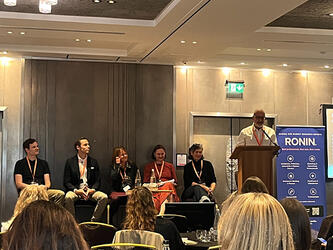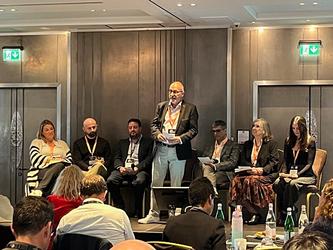A new relationship: Key themes from MRS B2B Research Conference

The importance of incentives
Alex Johnston, commercial director at Strat7 Jigsaw, said that to keep B2B panels engaged, incentives were crucial.
“Scrimping on incentives is such a false economy,” Johnston said. “It is better to put money in there to get that interest and activity than try to save money on that.”
He added that providing feedback to panel participants was “much more important in B2B than it is for consumers” to make sure they stay fully engaged.
The client and agency model
In January 2024, the Sage executive board agreed a five-year strategy for the business, and Basis worked with the company’s insight team to help get the customer narrative included.
Dan Coombes, head of activation at Basis, said: “On both sides, we are guilty of throwing around the words ‘partnership’ and ‘collaboration’ and only really paying lip service to them.
“We were trusted to act like an extension of the insight team. We were trusted to operate with stakeholders without you guys [clients] in the room. We were trusted to have an opinion and encouraged to be antagonists and challenge established ways of thinking. We were trusted to deliver the results to the highest level.”
Storytelling was also key, as was taking the initiative. Coombes added: “Sometimes you can’t wait to be asked. In this case, we would have waited a long time for a brief that never arrived, and we would have missed the bus. The customer would have stayed on the periphery. Sometimes it really pays off to go a bit rogue and be bold.”
The rise of AI
Paul Lawson, executive director at Verve, and Kate Downer, director at Verve, discussed how intelligent personas – namely, AI simulations of B2B audiences using high-quality data – could transform the industry.
Downer said that there could be a significant impact on representing the views of real people at scale. “The truth is all of us here today are limited by how difficult it is to find the right people, in the numbers, at the right time and as often as we want them,” she said.
“So, when I talk about the role of AI in transforming B2B research, AI can be quite divisive for really good reasons, but it is also incredibly helpful in challenging the sorts of problems I have outlined. It offers several key technologies that could dramatically change the way we do research.”
Data quality was key to bringing AI personas into the research process, Downer added: “What really matters is the quality, more than the quantity. A small amount of high-quality data is a really effective way to start, and much more helpful than a large amount of poor-quality data.”
Lawson said that researchers needed to get to grips with prompt crafting – on how to prompt and guide AI models to help achieve the best results. “The reality is that if you are going to be around for the next five to 10 years doing what we are doing, prompt crafting is something everyone will have to learn to do,” he explained. “The better the prompt, the better the answers.”
Lawson added: “We do not think this [AI personas] is a replacement for primary research – that is not part of the agenda at all. But we do think this is a great way of augmenting all of the great primary research that’s happening.
“It will increase the capacity to speak to people. Once we have these models and simulations up and running, ultimately we can ask the quick questions that at the moment are really hard to often do, as we can’t afford to go and find people and we haven’t got the time to find them to ask that quick question.”

We hope you enjoyed this article.
Research Live is published by MRS.
The Market Research Society (MRS) exists to promote and protect the research sector, showcasing how research delivers impact for businesses and government.
Members of MRS enjoy many benefits including tailoured policy guidance, discounts on training and conferences, and access to member-only content.
For example, there's an archive of winning case studies from over a decade of MRS Awards.
Find out more about the benefits of joining MRS here.














0 Comments